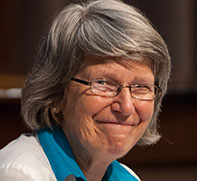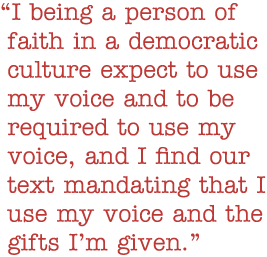

For more than 30 years, Sister Simone Campbell has been an advocate for policies that help people living in poverty. As an attorney, a Catholic nun, peace activist, and public speaker, she works on behalf of those she considers to be the constituency of Jesus-those on the margins of society.
So, in April 2012, when the Vatican issued a reprimand to her organization for promoting "radical feminist themes incompatible with the Catholic faith," she was stunned. Network, a Catholic advocacy group that Sister Simone leads, along with the Leadership Conference of Women Religious, were criticized publicly by the Congregation of the Doctrine of the Faith, a Vatican office assigned to enforce Church doctrine. Leadership Conference of Women Religious represents 80 percent of American nuns. In the Vatican assessment, made before the election of Pope Francis, the nuns were criticized for focusing too much on poverty and economic injustice instead of openly condemning abortion and same-sex marriage. Both organizations had signed a letter supporting passage of the Affordable Care Act in 2012, because of its potential positive impact on the most in need. They took this position in opposition to the United States Conference of Catholic Bishops, which had opposed aspects of the law that enhance women's access to reproductive health services.
"The Bishops said that the Affordable Care Act would support federal funding of abortion. The fact is that the bill specifically prohibited such funding and that there would be an independent audit to ensure that it didn't happen. It was straight politics. Two federal courts agree with my reading of the bill," said Campbell.
This was the first time that such a public divergence had occurred between Catholic Sisters and the Bishops," explained Campbell during Mobilizing Faith for Women, a forum convened by former U.S. President Jimmy Carter at The Carter Center in June 2013. "We won." she continued. "The bill passed and is now the law of the land."
Sister Simone was speaking at the conference, along with women from other countries and faiths, about the challenge of advancing women's rights within patriarchal institutions.
"The differences with the United States Conference of Catholic Bishops are really about culture; between monarchy and democracy," said Campbell.
While it may be unusual in the Catholic tradition for women in the laity to publicly disagree with the all male hierarchy, this does not strike Sister Simone as problematic.
"Being a person of faith in a democratic culture I expect to use my voice, and to be required to use my voice," she said. "I find our texts to mandate that I use my voice and the gifts that I am given. You don't hide your gifts."
Sister Simone and her colleagues did not retreat after the reprimand, but have respectfully and firmly pursued a path of service to the most vulnerable, launching "Nuns on the Bus," which has become known worldwide for efforts to change laws that create suffering for the poor.
"I work on these issues because of my faith," said Campbell. "In Matthew 25, Jesus says 'whatever you did for one of the least of these brothers and sisters of mine, you did for me,' and I realized that when we as Catholic nuns do direct charity, we know who we are helping. But through our public policy work we touch so many untold folks all across our nation and globe. So for me, the scriptures became about caring for the least, no matter what, whether you know them or not. We must not just do charity, but also do justice."